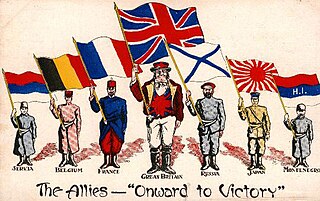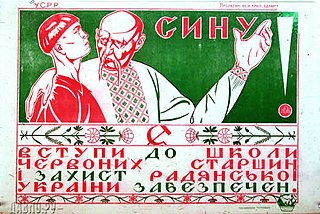Related Research Articles

A diaspora is a population that is scattered across regions which are separate from its geographic place of origin. The word is used in reference to people who identify with a specific geographic location,but currently reside elsewhere.
Nationalism is an idea or movement that holds that the nation should be congruent with the state. As a movement,it presupposes the existence and tends to promote the interests of a particular nation,especially with the aim of gaining and maintaining its sovereignty (self-governance) over its perceived homeland to create a nation-state. It holds that each nation should govern itself,free from outside interference (self-determination),that a nation is a natural and ideal basis for a polity,and that the nation is the only rightful source of political power. It further aims to build and maintain a single national identity,based on a combination of shared social characteristics such as culture,ethnicity,geographic location,language,politics,religion,traditions and belief in a shared singular history,and to promote national unity or solidarity. There are various definitions of a "nation",which leads to different types of nationalism. The two main divergent forms are ethnic nationalism and civic nationalism.
A nation is a type of social organization where a collective identity,a national identity,has emerged from a combination of shared features across a given population,such as language,history,ethnicity,culture,territory or society. Some nations are constructed around ethnicity while others are bound by political constitutions.

Ethnic cleansing is the systematic forced removal of ethnic,racial,or religious groups from a given area,with the intent of making the society ethnically homogeneous. Along with direct removal such as deportation or population transfer,it also includes indirect methods aimed at forced migration by coercing the victim group to flee and preventing its return,such as murder,rape,and property destruction. Both the definition and charge of ethnic cleansing is often disputed,with some researchers including and others excluding coercive assimilation or mass killings as a means of depopulating an area of a particular group.

Nation-building is constructing or structuring a national identity using the power of the state. Nation-building aims at the unification of the people within the state so that it remains politically stable and viable in the long run. According to Harris Mylonas,"Legitimate authority in modern national states is connected to popular rule,to majorities. Nation-building is the process through which these majorities are constructed." In Harris Mylonas's framework,"state elites employ three nation-building policies:accommodation,assimilation,and exclusion."

Korenizatsiia was an early policy of the Soviet Union for the integration of non-Russian nationalities into the governments of their specific Soviet republics. In the 1920s,the policy promoted representatives of the titular nation,and their national minorities,into the lower administrative levels of the local government,bureaucracy,and nomenklatura of their Soviet republics. The main idea of the korenizatsiia was to grow communist cadres for every nationality. In Russian,the term korenizatsiya (коренизация) derives from korennoye naseleniye. The policy practically ended in the mid-1930s with the deportations of various nationalities.
Civic nationalism,otherwise known as democratic nationalism,is a form of nationalism that adheres to traditional liberal values of freedom,tolerance,equality,and individual rights,and is not based on ethnocentrism. Civic nationalists often defend the value of national identity by saying that individuals need it as a partial shared aspect of their identity in order to lead meaningful,autonomous lives and that democratic polities need a national identity to function properly. Liberal nationalism is used in the same sense as 'civic nationalism',but liberal ethnic nationalism also exists,and "state nationalism" is a branch of civic nationalism,but it can also be illiberal.

Russian nationalism is a form of nationalism that promotes Russian cultural identity and unity. Russian nationalism first rose to prominence as a Pan-Slavic enterprise during the 19th century Russian Empire,and was repressed during the early Bolshevik rule. Russian nationalism was briefly revived through the policies of Joseph Stalin during and after the Second World War,which shared many resemblances with the worldview of early Eurasianist ideologues.

Macedonian nationalism is a general grouping of nationalist ideas and concepts among ethnic Macedonians that were first formed in the late 19th century among separatists seeking the autonomy of the region of Macedonia from the Ottoman Empire. The idea evolved during the early 20th century alongside the first expressions of ethnic nationalism among the Slavs of Macedonia. The separate Macedonian nation gained recognition during World War II when the Socialist Republic of Macedonia was created as part of Yugoslavia. Macedonian historiography has since established links between the ethnic Macedonians and various historical events and individual figures that occurred in and originated from Macedonia,which range from the Middle Ages up to the 20th century. Following the independence of the Republic of Macedonia in the late 20th century,issues of Macedonian national identity have become contested by the country's neighbours,as some adherents to aggressive Macedonian nationalism,called Macedonism,hold more extreme beliefs such as an unbroken continuity between ancient Macedonians,and modern ethnic Macedonians,and views connected to the irredentist concept of a United Macedonia,which involves territorial claims on a large portion of Greece and Bulgaria,along with smaller regions of Albania,Kosovo and Serbia.
Albanian nationalism is a general grouping of nationalist ideas and concepts generated by ethnic Albanians that were first formed in the 19th century during the Albanian National Awakening. Albanian nationalism is also associated with similar concepts,such as Albanianism ("Shqiptaria") and Pan-Albanianism,that includes ideas on the creation of a geographically expanded Albanian state or a Greater Albania encompassing adjacent Balkan lands with substantial Albanian populations.
Among scholars of nationalism,a number of types of nationalism have been presented. Nationalism may manifest itself as part of official state ideology or as a popular non-state movement and may be expressed along civic,ethnic,language,religious or ideological lines. These self-definitions of the nation are used to classify types of nationalism,but such categories are not mutually exclusive and many nationalist movements combine some or all of these elements to varying degrees. Nationalist movements can also be classified by other criteria,such as scale and location.
The World Macedonian Congress is a Macedonian diaspora organization based in Skopje. It presents itself as an organization fighting and demanding for more human rights to ethnic Macedonians on an international level,but is seen as a nationalist or ultranationalist organization by researchers. The organization was registered during the fall of communism,on 15 September 1990 by Todor Petrov,who is also the president of the organization.
Nationalities Papers is a peer-reviewed academic journal published by Cambridge University Press for the Association for the Study of Nationalities. The editor-in-chief is Harris Mylonas. It publishes articles on nationalism,minorities,and ethnic conflict,with a regional focus on Central and Eastern Europe,the Balkans,the former Soviet Union,Turkey,and Central Asia. The journal is interdisciplinary,with authors from a variety of backgrounds,including history,political science,sociology,anthropology,and literature. Nationalities Papers started in 1972 and currently publishes 6 issues per year.
Ethnic nationalism,also known as ethnonationalism,is a form of nationalism wherein the nation and nationality are defined in terms of ethnicity,with emphasis on an ethnocentric approach to various political issues related to national affirmation of a particular ethnic group.
Reeta Chowdhari Tremblay is a Canadian political scientist and former senior academic administrator. She is an internationally recognized expert on Kashmir and India-Pakistan.

Barry Victor Sautman is a professor emeritus with the Division of Social Science at the Hong Kong University of Science and Technology. He holds both Canadian and American nationalities and he speaks both English and Cantonese.

Antiquization,otherwise known as ancient Macedonism,is a term used mainly to critically describe the identity policies conducted by the nationalist VMRO-DPMNE-led governments of North Macedonia in the period between 2006 and 2017. In the contemporary Macedonian discourse,antiquization refers to the identitarian policies based on the assumption that there is a direct link between today's ethnic Macedonians and Ancient Macedonians. The politics of the ex-Yugoslav era therefore not only embrace the revival of the ancient heritage of the Ancient Macedonians,including the heritage of Philip II and his son Alexander the Great,but also seek to depict a coherent continuity of history and descendancy from the ancient Kingdom of Macedon until the modern Republic of North Macedonia in order to prove the uninterrupted existence of the contemporary Macedonians. Criticized as pseudohistoric,this idea remains widespread in North Macedonia despite the fact that there is no evidence for the alleged ethnic continuum.
Andreas Wimmer is a Swiss sociologist who is the Lieber Professor of Sociology and Political Philosophy at Columbia University. He has a PhD in social anthropology from the University of Zurich.
Vicken Cheterian is a Lebanese-born journalist and author,who teaches international relations at Webster University Geneva. He has also lectured at University of Geneva and SOAS University of London (2012-14). Cheterian is also a columnist for the Istanbul-based weekly Agos. He holds a PhD from Graduate Institute of International and Development Studies (IUHEI).
Greek ethnicity and Greek citizenship are two distinct legal statuses,both being derived from Greek citizenship law. Thus,Greek ethnicity establishes the requirement for the right to apply for Greek citizenship due to descent.
References
- ↑ Google scholar profile.
- ↑ Nationalities Papers website. Retrieved 13 November 2018.
- ↑ "Peter Katzenstein Book Prize".
- ↑ "European Studies Book Award". Council for European Studies. Retrieved 9 November 2015.
- ↑ Mylonas, Harris. "Homepage" . Retrieved 13 September 2013.
- ↑ Harris Mylonas and Scott Radnitz. "The Disturbing Return of the Fifth Column: How Enemies Within—Real and Imagined—Are Influencing Geopolitics", Foreign Affairs, August 26th 2022; Scott Radnitz and Harris Mylonas. "Putin’s warning about Russian ‘fifth columns’ has a long, sordid lineage", Washington Post's Blog The Monkey Cage, March 30 2022; Harris Mylonas. “Whither Nation-Building?” e-International Relations, May 8th 2013; Harris Mylonas. “The Challenges of Nation-Building in the Syrian Arab Republic”, in The Political Science of Syria’s War, POMEPS Briefing #22, December 18th 2013, pp. 57-59; Harris Mylonas. 2013. “Revisiting the Link: Politicizing Religion in Democratizing Countries”, Harvard International Review, Vol. 34, Issue 4 (Spring), pp. 48-52; Harris Mylonas and Emirhan Yorulmazlar. "Regional multilateralism: The next paradigm in global affairs Archived 2022-03-25 at the Wayback Machine ", CNN.com, January 14th 2011; Thomas Meaney and Harris Mylonas."The Pandora's box of sovereignty", Los Angeles Times, August 13th 2008; Wilder Bullard and Harris Mylonas. “This is no 1989 moment for the Arab world”, Guardian.co.uk, February 8, 2011; Keith Darden and Harris Mylonas. "The Promethean Dilemma in Third-Party Nation-Building", The Monkey Cage, September 20th 2012.
- ↑ Akis Georgakellos and Harris Mylonas. 2023. "An Election Won’t End Greece’s Troubles: Sunday’s vote is unlikely to yield a new government," Foreign Policy, May 19; Harris Mylonas. 2019. "After a decade of crisis, Greek politics are turning normal and more technocratic," The Washington Post blog, The Monkey Cage, July 14; Harris Mylonas. 2017. "The Volatile State of Greek Politics," Foreign Affairs, September 27; Akis Georgakellos and Harris Mylonas. 2016. "Between Trump and the Troika: Greece After the U.S. Election," Foreign Affairs, November 16; Akis Georgakellos and Harris Mylonas. 2015. "Greece just called new elections. Here’s the background you need to understand them," Foreign Affairs, August 20;Harris Mylonas. 2015. "The Agreekment that could break Europe: Euroskeptics, Eurocritics, and Life After the Bailout," Foreign Affairs, July 14; Harris Mylonas. 2014. "Democratic Politics in Times of Austerity: The Limits of Forced Reform in Greece," Perspectives on Politics, Vol. 12, No. 2 (June): 435-443; Harris Mylonas. 2013. “Greece,” European Journal of Political Research Political Data Yearbook, Volume 52, Issue 1: 87–95; George Th. Mavrogordatos and Harris Mylonas. 2012. “Greece,” European Journal of Political Research Political Data Yearbook, Volume 51, Issue 1: 122-128; George Th. Mavrogordatos and Harris Mylonas. 2011. “Greece,” European Journal of Political Research Political Data Yearbook, Volume 50, Issue 7-8: 985-990; Harris Mylonas. 2011. "Is Greece a Failing Developed State?" in Botsiou, Konstantina E.; Klapsis, Antonis (eds.) The Konstantinos Karamanlis Institute for Democracy Yearbook 2011: The Global Economic Crisis and the Case of Greece. Springer.
- ↑ "Board of Directors". Association for the Study of Nationalities. Retrieved 13 September 2013.
- ↑ Mylonas, Harris. "Elliott School of International Affairs" . Retrieved 5 June 2014.
- ↑ Harvard Academy for International and Area Studies website. Retrieved 13 September 2015.